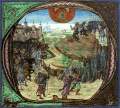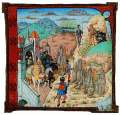banderies, estate armies
| |
| |
|
Battalion, military unit. In the Hungarian medieval army banderies were set up according to principles formulated in the Árpád age. In accordance with these the king, the bishops, the barons and the prior of Aurania led their troops to war under their own banners. In the royal bandery there were warriors from the court, in ecclesiastic and secular banderies there were familiares and people of the estates obliged to render military service. The organisation of banderies underwent a major change at the end of the Sigismund age: the owners of big estates had to set up their own banderies - whether they had an honour or not. So they became barons, and the noblemen of the county had to fight in the county banderies. In the 15th century a bandery consisted of about 400 people. (The establishment of the bandery army had nothing to do with the Angevines!)
IT
estate armies
A military system of recruitment decided at the 1397 parliament at Temesvár. The huge private estates - received as land gifts at the beginning of the Sigismund age - and the defeat at Nicapole (1396) made this system necessary. It is not known whether this resolution was made for one occasion or for a longer period. The expression estate army was not referred to in any laws or by later sources, but is rather a term applied by historians.
IT


